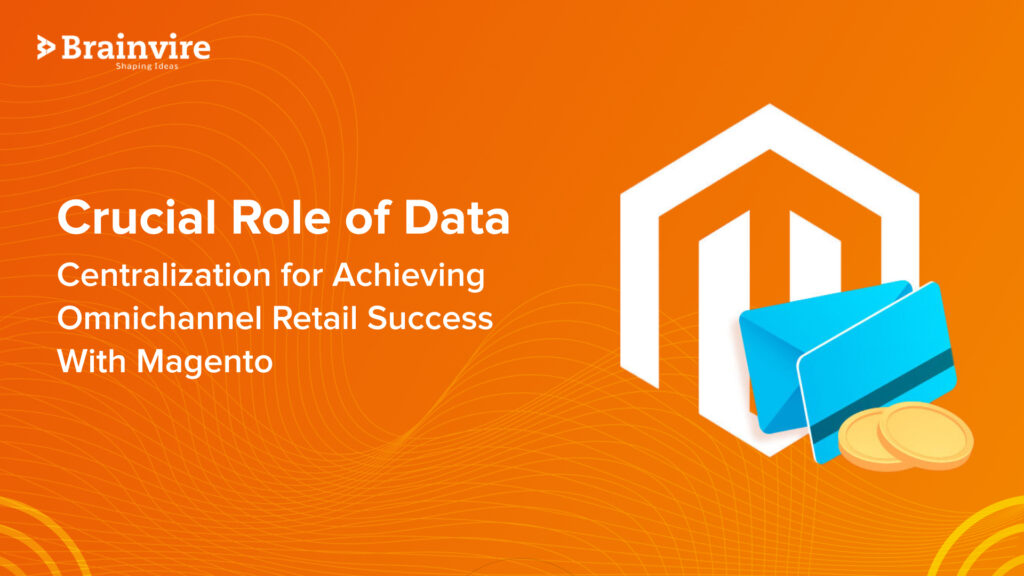Data is the new gold in the digitized business environment of today’s day and age. This also means businesses must make the most of available customer data and use it to their advantage. However, this also means ensuring data’s practical use and storage for seamless access to the correct information when needed.
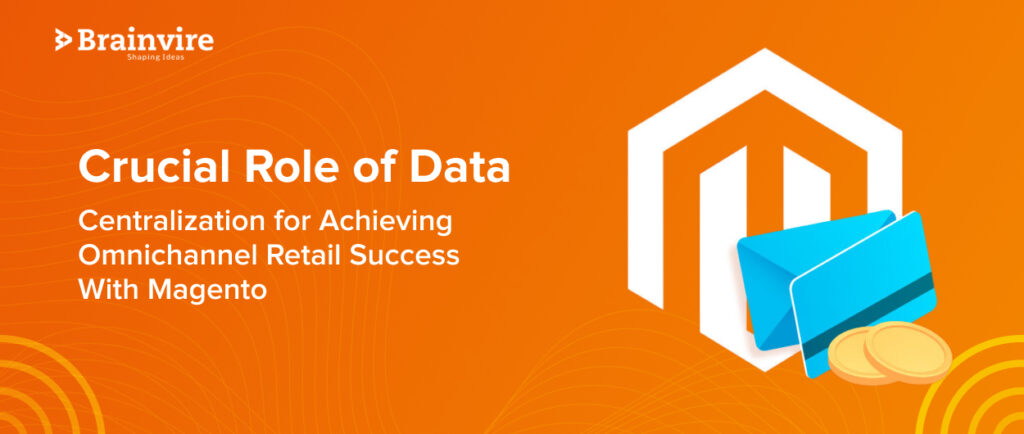
Besides, adequate data storage can help you facilitate omnichannel retailing, especially when using platforms like Magento. This becomes an important consideration given that 60% of customers participate in omnichannel shopping. Facilitating centralized data storage can be very helpful in enhancing omnichannel retail with Magento.
But how does data centralization help facilitate seamless omnichannel retail with Magento? Let’s dive into the nuances of the matter and enhance our understanding of omnichannel retailing with Magento.
Why Omnichannel Solutions Are Best For Retail?
Retail stores have evolved dramatically over the past few years, with technological advancements paving the way for innovation. What started as conventional retail stores soon went online to meet more customers and enhance their reach.
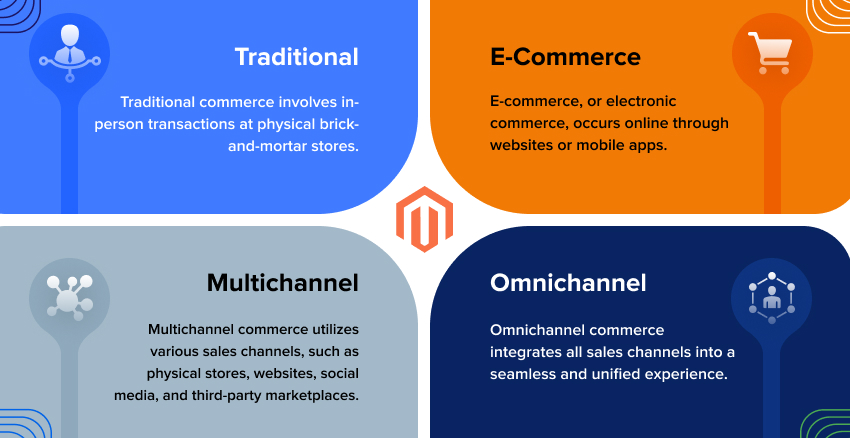
However, things have changed again in the post-pandemic world, where most retailers take an omnichannel approach to retailing. This means integrating offline and online stores, enabling customers to shop in-store, online, or with a combination of both.
One of the primary reasons retailers are taking this approach is the fast-evolving customer expectations. Technological advancements are key to customer satisfaction, with most customers choosing online shopping over others. But there are still many customers who prefer shopping physically just for the sake of a personalized shopping experience.
The Rise Of Hybrid Shopping Approach
Today, many customers choose a combination of both online and offline shopping based on their preferences. This has made it very important to ensure businesses meet these customer expectations, and an omnichannel approach is the best way to realize that goal.
Unsurprisingly, most retailers face many challenges when leveraging omnichannel retailing to their advantage. Some of the best-known of these challenges include integrating offline and online data, failing to measure the right KPIs, lack of inventory visibility, ineffective order fulfillment, and complications with supply chain management. As a result, it is important to ensure retail businesses are aware of these challenges and take appropriate measures to address them accordingly.
Magento: Widely Accepted Platform for eCommerce Solutions
Running a successful online business is rarely possible unless you leverage the offerings of competent solutions such as Magento. This is one of the leading open-source eCommerce solutions written in PHP. Businesses using the platform must hire dedicated Magento developers to access all its features and functionalities.

Magento 2 is the latest version of the platform, offering more advanced features and technologies to drive seamless digital transformation. As a result, Magento 2 is 25 times faster than its predecessor Magento 1. It is also worth noting that extensive product management abilities are one of the best things about using Magento for your business.
Besides, Magento offers a plethora of different features and functionalities that can be very helpful to digital businesses. Some of the best-known features of Magento include better customer segmentation, access to multiple security scan tools, customer attribute management, return management authorization, and order archiving, to name a few.
Using Magento also offers many benefits, including better customer support, the ability to enhance customer journeys, enhanced security features, and seamless customization with the Magento Marketplace.
Magento 2 is the ideal platform for businesses looking to deliver omnichannel experiences to customers. It has many features to help businesses facilitate better inventory management, data management, integration with third-party extensions, automated marketing, integration with ERP and CRM solutions, and more. Integrating Adobe Experience Manager services can further enhance these capabilities by ensuring seamless content management and personalized customer experiences. These Magento 2 features are ideally designed to help retailers of all scales deliver omnichannel shopping experiences.
The Role Of Data In Omnichannel Retail
Delivering an optimal omnichannel experience can become challenging without easy access to the right datasets. Accessing, managing, and storing the right data can help retailers better understand their customers and other business KPIs.
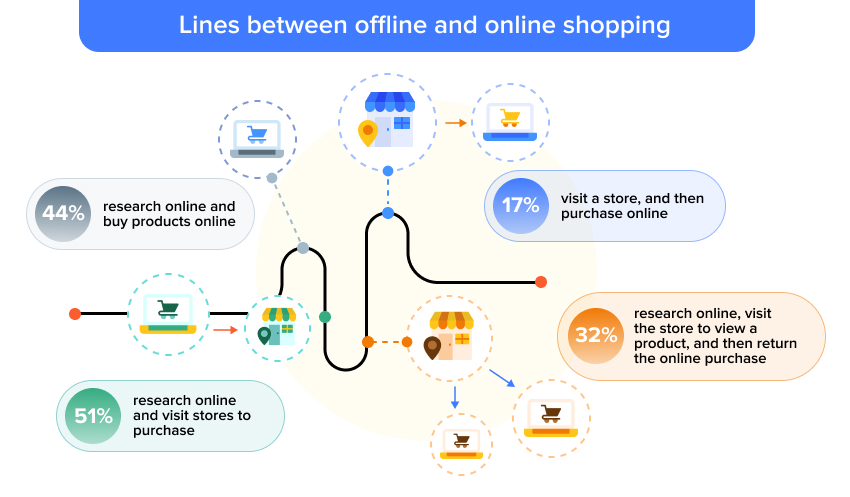
This further makes it easier to facilitate informed and effective decision-making for retailers. As a result, it is fair to conclude that data is the lifeblood of every omnichannel retailer. Thanks to the latest technological advancements, retailers can use many different types of data sets to their advantage. For instance, there is customer data to help businesses better understand customer expectations and needs.
Besides, there is product and inventory data that helps retailers maintain the optimum stock of the right products based on the needs and wants of customers. More importantly, there are also sales data that businesses can use to monitor sales and better understand the performance of specific products among a given customer base.
Unfortunately, managing all these disparate data sources and generating valuable insights from them is anything but easy. This can lead to further aggravation of existing data management challenges, such as ineffective data integration, compromised data quality, ineffective data governance and compliance, and the lack of technical data compatibility.
These challenges can be very frustrating since they prevent retailers from making the most of the available data. Fortunately, centralizing your data storage can help address these challenges and help you make the most of the available data.
Data Centralization in Magento
Ensuring centralized data storage for omnichannel retailing is one of the most important aspects needed to ensure a business’s success. Centralized data with Magento can offer multiple different advantages for your business.
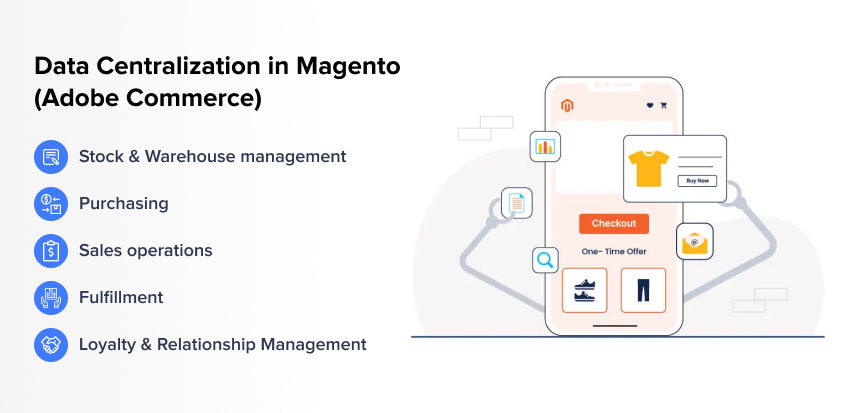
Some of the best-known of these advantages include increased focus, effective optimization, more security with better consistency, and effective use of scarce resources. It is worth noting that Magento is one of those few eCommerce platforms that can help you ensure centralized data storage easily.
The solution easily integrates with other business tools such as CRM solutions, ERP, sales, and marketing solutions. This helps Magento retailers create an integrated business solution that collects data from different business aspects. This enables you to get a centralized view of all important data points and make more informed business decisions to drive growth.
One of the primary reasons most Magento development service providers recommend using the solution for centralized data management is the perks that come with it. For instance, centralizing your business data while leveraging the potential of Magento ensures you save more time and dedicate these resources to other value-driven tasks.
Besides, access to real-time data, savings on maintenance costs, and an all-in-one data storage solution are other advantages of using Magento for centralized data.
Enhancing Customer Experience Retailers With Magento
Centralized data can be very helpful for retailers to offer more effective and personalized experiences to their customers. Magento can help your business synchronize all aspects of customer data. This will include everything from customer preferences to search history, reward history, and behavioural patterns. This will help you get highly valuable insights into your customers and market your products accordingly. As a result, you can deliver your customers with more personalized shopping experiences, further helping you boost customer loyalty.

Another great thing about using the Magento solution for centralized data storage is effective inventory management and order fulfillment. This can help you manage all data from multiple inventories based on the sources and types of products. This will help you get a comprehensive view of all your inventory, ensuring you never run out of stock based on the market’s requirements. Besides that, this also helps you ensure effective order fulfillment with efficient and cost-effective shipping.
Centralizing data with Magento also has many advantages in terms of maintaining consistent pricing and facilitating effective promotions. The Magento solution can help you keep track of all your product prices, make alterations based on market changes, and boost customer credibility. Besides that, this can also help you facilitate more effective marketing with targeted promotions based on the available customer data. You can use this data to determine customer’s needs and preferences to deliver promotion campaigns accordingly.
Streamlining Operations

Data centralization with the Magento solution can help you streamline all business processes to drive better efficiency. Besides that, this can also help you boost accountability within the business. But more importantly, this can help you better manage your supply chains and leverage the potential of predictive technologies to drive informed decision-making.
As Magento can help you access all inventory-related data, it will become much easier to determine and address existing flaws. For instance, suppose you find discrepancies in monitoring your inventory data. You can then leverage data centralization in Magento to determine those gaps and take necessary measures to address them accordingly.
Another great way to use data centralization in Magento for streamlining operations is by using predictive technologies to forecast demands. Since your Magento solution will have access to all the relevant data sets, it can evaluate those data sets to determine future market trends. This can help you forecast future demand for a given product or service and make necessary changes to ensure your business meets all market demands effectively.
Supply chain management is one of the most challenging aspects of running an online business in this interconnected world. But centralized data in Magento can help your business simplify this for the good. You can integrate your business’s ERP with the Magento solution and track all your supply chain-related data. This will help you facilitate effective supply chain management while addressing any existing gaps within all operations.
Marketing and Sales Optimization
Marketing has evolved a great deal with the latest technological advancements taking center stage in today’s sphere. Therefore, it is very important to ensure you leverage the potential of data and strengthen your marketing campaigns to drive better results. Centralized data in Magento can help you strengthen the effectiveness of your marketing campaigns to reach more customers with effective marketing campaigns.
Most businesses are now using customer data to facilitate highly effective targeted marketing campaigns. Fortunately, centralized data in Magento can help your business make the most of customer data and facilitate better-targeted marketing. For instance, you can access specific data sets of customers to determine their needs and preferences based on criteria such as age and other demographic factors. You can then determine trends and deliver highly targeted campaigns to drive better conversions.
Most online businesses are known for making data-driven business decisions to minimize risk and drive growth. With its centralized data storage, the Magento solution can help access advanced data insights and analytics. Businesses can use these data and insights to drive more informed decision-making based on relevant data. This can help them determine risk factors beforehand and take measures to avoid them or take measures to mitigate their impact on the business.
Combining effective targeted marketing with better-informed decision-making will help you drive better conversion rates. Even the best omnichannel retailers leverage these tactics to enhance the effectiveness of their marketing campaigns. As a result, they can easily drive better conversion rates with a focus on enhancing customer loyalty simultaneously.
Data Security and Compliance
Simply collecting data without ensuring their security and compliance with the latest legal standards can impact your business. Data security has become a major concern among stakeholders, given the increase in data breaches in recent times. Therefore, it is important to ensure that customers can trust your business with their data.
But this is not just about customer data but also all relevant business data. Since you are storing all your data in centralized storage, you must take all measures to protect them from malware and similar complications. Fortunately, the centralized data in the Magento solution is a great way to ensure all your data remains safe and secure. This is an important consideration for businesses since data breaches can leak sensitive information, leading to adverse consequences for the business.
Another important consideration with Magento data centralization is ensuring unmatched compliance with GDPR norms. This is not much of a concern with Magento since the entire solution is GDPR-compliant. More importantly, you need not install any third-party extensions to ensure compliance on this front. The solution will help you view saved information, display cookies, consent, and more.
All these data security and compliance measures play a crucial role in building better trust among customers. Magento data centralization ensures all your data remains in a centralized database. This further makes ensuring effective data security across all data points easier. As a result, building trust among customers, fostering better relationships, and enhancing customer loyalty becomes much easier.
How to Implement Data Centralization in Magento?
While there are many upsides to implementing data centralization in Magento, going through this process without the right knowledge can be detrimental. This makes it important to ensure you take the right steps to implement data centralization in Magento. This will help ensure you avoid all potential pitfalls during the entire implementation.
To implement data centralization in Magento, you first need to start with physical integration. You must integrate all your business solutions with the Magento eCommerce platform. You must integrate all your business solutions, including Magento POS, ERP, CRM, and other systems you use for your business. Following this, you must start with the digital integration of data. This means centralizing data from multiple sources into a centralized Magento database.
You can leverage many best practices and tips to ensure the seamless implementation of centralized data in Magento. First, you must start by defining all the goals you wish to realize with the integration. Then, you must curate a roadmap concerning those goals. This will help simplify Magento’s centralized data integration process while significantly reducing the risk of going wrong.
Data centralization in Magento is far simpler than most similar platforms. However, there are still certain uncertainties you need to be mindful of during the integration process. Hence, it ensures no inconsistency between data sources, which can harm the entire process. Besides, you must never settle for older technologies when integrating data centralization in Magento.
Future Trends in Data Centralization and Omnichannel Retail
Given all the latest developments on this front, it is not surprising that a centralized approach
toward data storage and management is inevitable. However, there are some noteworthy technological advancements in recent times shaping the future of data centralization in omnichannel management.
Most notably, there is the application of advanced technologies such as Artificial Intelligence (AI), the Internet of Things (IoT), and blockchain integration. These technologies will play a very significant role in transforming data centralization in omnichannel retailing.
For instance, AI can help better evaluate data and generate better insights. On the other hand, IoT devices can be highly effective in helping businesses generate accurate data. Lastly, blockchain can help simplify data storage while boosting accountability and security with cryptography technology.
The future of omnichannel retail will be very different than many might have imagined a decade or two ago. The latest technological advancements make omnichannel retail a preferable choice for retailers of varied scales. This helps them build better customer relationships and boost loyalty among customers. Besides that, technology will have businesses deliver more comprehensive personalized experiences.
Conclusion
Data centralization has become one of the most important requirements for online businesses. This can help businesses comprehensively view all their business-related aspects and better understand how things work. Data centralization with the Magento eCommerce platform is even more advantageous for omnichannel retailers.
This integration can help omnichannel retailers get better insights into specific KPIs to determine valuable insights. They can then leverage the potential of solutions such as Magento to transform their business and ensure it aligns with the latest market developments. So ensure you are mindful of this information and leverage centralized data management integration in Magento to get the best results.
FAQs
Data centralization in the context of omnichannel retail in Magento means integrating data from multiple sources. This further helps retailers build better customer relationships and foster business growth.
Magento data centralization offers many benefits for omnichannel retailers, such as saving time and dedicating these resources to other value-driven tasks. Access to real-time data, savings on maintenance costs, and an all-in-one data storage solution are other advantages of using Magento for centralized data.
Ineffective data integration, compromised data quality, ineffective data governance, and compliance, and the lack of technical data compatibility are challenges arising from not centralizing data in an omnichannel retail setup using Magento.
Data centralization gives you a comprehensive view of all customers and specific criteria such as their preferences, behavior, history, and more. This helps retailers deliver better personalization, which further converts to better customer experiences.
Sales, inventory, customer, and market data are the most important data types you must centralize for effective omnichannel retail management with Magento.
The Magento data migration extension is one of the best Magento extensions or tools that can help with data centralization for omnichannel retail.
Data centralization directly impacts inventory management and availability across different sales channels. For instance, a centralized approach can help you view your stocks in real-time and provide customers with the live availability status of products.
Data centralization can positively affect your omnichannel retailer’s pricing strategies and promotions. For instance, this can help retailers save on costs and offer customers discounted products. Besides that, this can also help retailers leverage personalization and enhance the effectiveness of their promotion campaigns.
Related Articles
-
Smart Ways to Generate Google or Facebook Product Feed in Magento 2
A product data feed or product feed is a comprehensive product list document that consists of all product details. These details are inclusive of product prices, images, categories, and other
-
Basics of a Service Marketplace Platform and Its Development
Service marketplaces (SM) have made their mark on the on-demand economy. The popularity of on-demand service marketplaces such as Uber, Fiverr, Freelancer, Consultants 500, Urban Clap, TaskRabbit, etc, is on
-
Implementing Two-Factor Authentication Security Systems In Magento:
Things are becoming easier and convenient for us in this digital era. The online retail store and its payment process are at our fingertips. Sounds interesting, isn’t it? Yes, at

